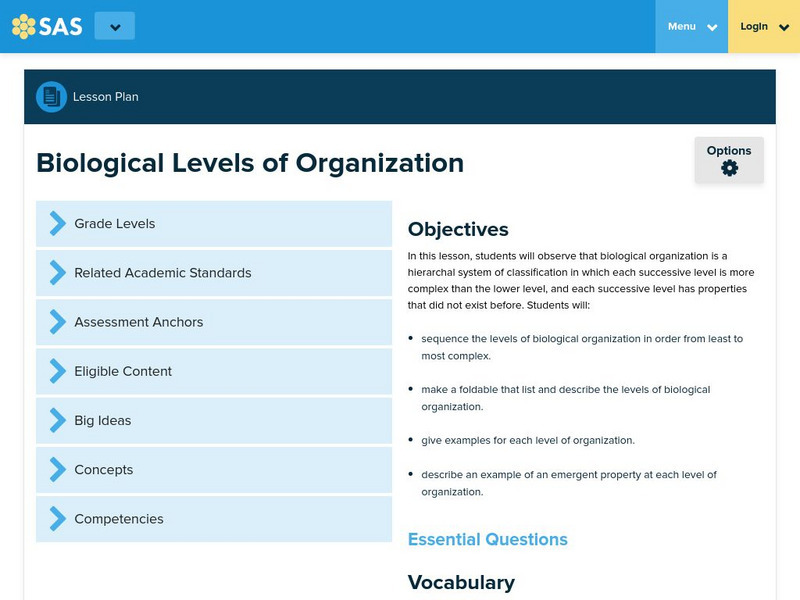Curated OER
WHAT, IF ANYTHING, IS A ZEBRA?
Students read the essay, "What, If Anything, Is a Zebra?" following a teacher made reading guide. They investigate cladistics, shared derived characteristics, with further online research to enhance their study of evolution and...
Curated OER
Tree-Mendous!
Students classify trees. In this tree-mendous activity, students categorize a variety of trees to assist them in playing a Jeopardy like game. Students identify new vocabulary terms and classify the uses and benefits of trees for...
Curated OER
Taxonomy and the World of Microorganisms and Viruses
In this taxonomy worksheet, students understand how organisms are classified using Linnaeus' system. Students classify organisms as either plant or animal. This worksheet has 24 fill in the blank and 6 matching questions.
Curated OER
Insect Book
Fifth graders select an insect and create a page for an Insect ABC book to display their research. They choose an insect from a given letter of the alphabet and use KidPix to illustrate. They write 2-3 sentences describing their insect...
Curated OER
Exploring Alaska Foilage In Russian
Seventh graders investigate the concepts of how plants are part of daily culture in Russia. The skills of naming different plants is practiced. Students take a survey of the nature that is found in the area in which they live. This is...
Curated OER
Variation
Students practice sorting living things into groups using their characteristics. Using pictures of leaves and animals, they sort them based on their color and shape and write the objects characteristics under the picture. They share...
Curated OER
Grouping and Changing Materials
Students feel and observe different types of materials. Using the internet, they sort objects based on the materials they are made from and justify their reasons for putting it in a certain category. They identify objects that could...
Curated OER
Classifying Candy III
Students create a classification tree based on grouping candy with eight different properties. This allows students to understand how living things are classified.
Curated OER
Classifying Rocks
Students classify rocks into groups after they observe the rocks and identify properties that can be used to divide them into groups. They then identify other properties that could be used to classify other objects into groups.
Curated OER
Adaptations
Students identify features of animals that enable survival in particular environments and group animals on the basis of their similarities. They compare and contrast features of groups of animals.
Curated OER
Populations
Students calculate the area of grasslands needed to support a small pride of lions. They also identify food web links in an ecosystem and trace the energy pathways in an ecosystem.
Curated OER
Animal clues
Fifth graders use general knowledge to make educated guesses about the habitat and survival strategies of animals from Australia, Antarctica and Africa. They research to confirm and check ideas and group animals in a variety of ways.
Curated OER
Survival
Students identify characteristics of Australia, Africa and Antarctica and compare and contrast them to each other. They work together to identify adaptations that animals have used to survive. They also practice classifying animals.
Curated OER
Analysing Scientific Explanations for Megafauna Extinction
Students compare explanations for Australian's megafauna extinctions and identify reasons for popular acceptance of certain scientific explanations. They debate and analyze scientific explanations.
Curated OER
Delicious Graphing
Fourth graders sort trail mix by type and use that information to create different types of graphs for comparing.
Curated OER
The "Nuts and Bolts" of Taxonomy and Classification
Students develop classification scheme that meets the established rules of the Linnaean system. They write one page essay on classification choices.
Curated OER
To Classify Beans And Peas
First graders record information on a bar graph and interpret the information given. They identify five different kinds of beans and three different kinds of peas. They work in groups of four and sort the beans by size or shape.
Other
Pennsylvania Doe: Lesson Plan: Biological Levels of Organization
A lesson plan that takes students through the process of organizing a set of biological picture cards according to levels of complexity.



















